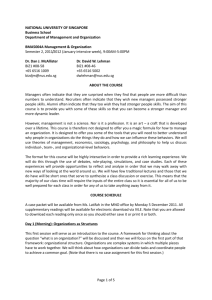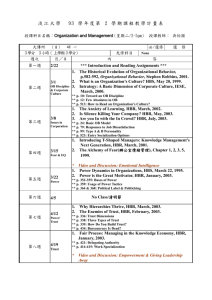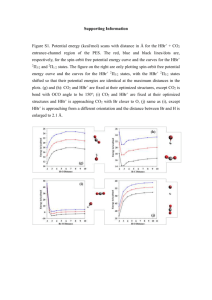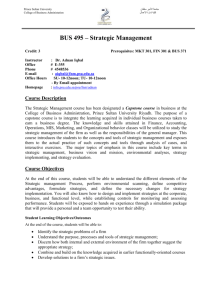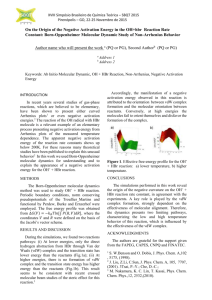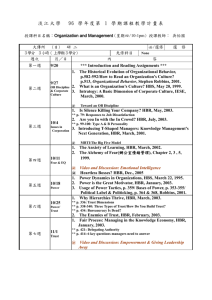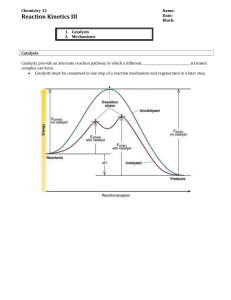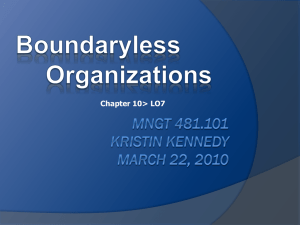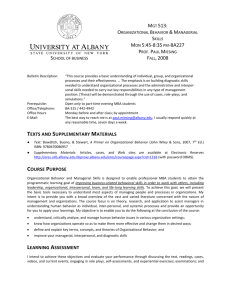MAN f383 - Advocacy and Leadership Skills - Daly
advertisement
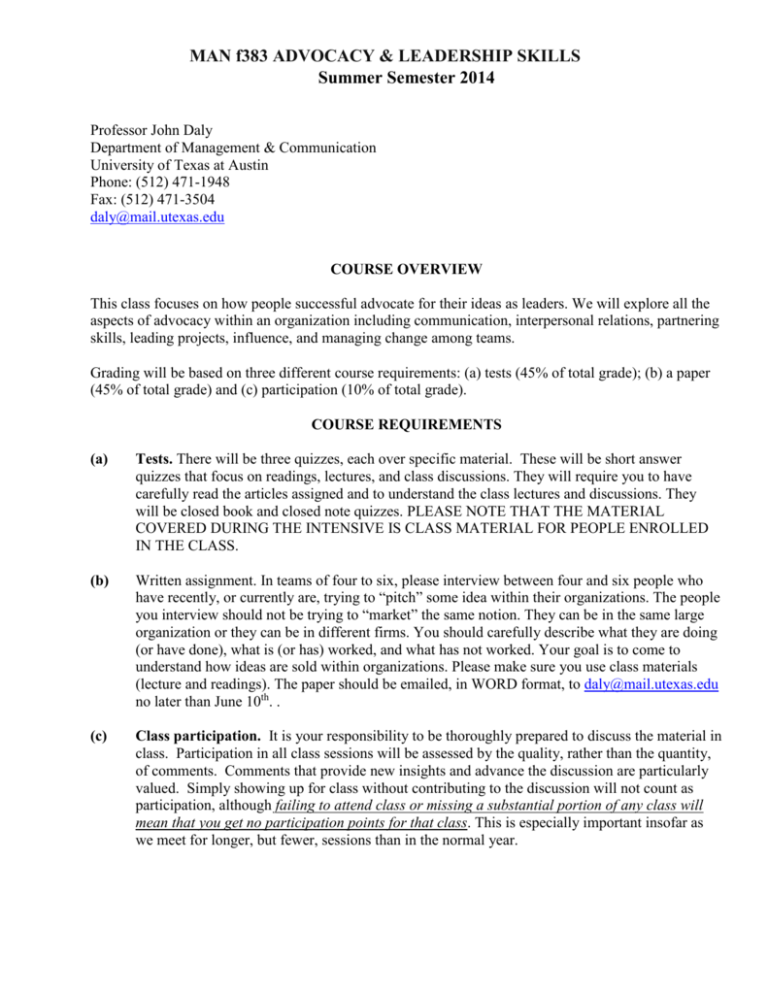
MAN f383 ADVOCACY & LEADERSHIP SKILLS Summer Semester 2014 Professor John Daly Department of Management & Communication University of Texas at Austin Phone: (512) 471-1948 Fax: (512) 471-3504 daly@mail.utexas.edu COURSE OVERVIEW This class focuses on how people successful advocate for their ideas as leaders. We will explore all the aspects of advocacy within an organization including communication, interpersonal relations, partnering skills, leading projects, influence, and managing change among teams. Grading will be based on three different course requirements: (a) tests (45% of total grade); (b) a paper (45% of total grade) and (c) participation (10% of total grade). COURSE REQUIREMENTS (a) Tests. There will be three quizzes, each over specific material. These will be short answer quizzes that focus on readings, lectures, and class discussions. They will require you to have carefully read the articles assigned and to understand the class lectures and discussions. They will be closed book and closed note quizzes. PLEASE NOTE THAT THE MATERIAL COVERED DURING THE INTENSIVE IS CLASS MATERIAL FOR PEOPLE ENROLLED IN THE CLASS. (b) Written assignment. In teams of four to six, please interview between four and six people who have recently, or currently are, trying to “pitch” some idea within their organizations. The people you interview should not be trying to “market” the same notion. They can be in the same large organization or they can be in different firms. You should carefully describe what they are doing (or have done), what is (or has) worked, and what has not worked. Your goal is to come to understand how ideas are sold within organizations. Please make sure you use class materials (lecture and readings). The paper should be emailed, in WORD format, to daly@mail.utexas.edu no later than June 10th. . (c) Class participation. It is your responsibility to be thoroughly prepared to discuss the material in class. Participation in all class sessions will be assessed by the quality, rather than the quantity, of comments. Comments that provide new insights and advance the discussion are particularly valued. Simply showing up for class without contributing to the discussion will not count as participation, although failing to attend class or missing a substantial portion of any class will mean that you get no participation points for that class. This is especially important insofar as we meet for longer, but fewer, sessions than in the normal year. SCHEDULE, TOPICS, AND ASSIGNMENTS Date Topic April 26 Communicating Your Messages Read: Daly, Advocacy (Chapters 1-3) April 27 Building Credibility & Enhancing Partnerships Read: Daly, Advocacy (Chapters 4-6, 8) May 2-3 Influencing Others & Leading Change Read: Daly, Advocacy (Chapters 7, 9-14) Quiz 1: This brief quiz, given first thing on the 2nd, will cover material presented on April 26th-27th Read: C. Christensen, H. Baumann, R. Ruggles, & T. Sadtler “Disruptive Innovation” (HBR) L. Downes & P. Nunes “Big Bang Disruption” (HBR) J. Kotter “Leading Change: Why Transformation Efforts Fail” (HBR) T. Larkin & S. Larkin “Reaching and Changing Frontline Employees” (HBR) June 15 Leadership Challenges Quiz 2: This quiz will cover materials presented on May 2nd=3rd (first thing on the 15th) Read: T. Amabile & S. S. Kramer, “The Power of Small Wins” (HBR) L. Bossiby “What Your Leader Expects of You” (HBR) D. Kahnenman “Big Decisions” (HBR) J. Kotter “What Leaders Really Do” (HBR) J. Pfeffer: “Six Dangerous Myths About Pay” (HBR) M. Porter, J. Lorsch, & N. Nohria “Seven Surprises for New CEOs” (HBR) M. Watkins “Managers into Leaders (HBR) June 28 Leadership Application Read: J. Brett, K. Behfar, & M. Kern “Managing Multicultural Teams’ (HBR) A. Edmundsen “Teamwork on the Fly” (HBR) L. Gratton & T. Erickson “8 Ways to Build Collaborative Teams” (HBR) B. Groysberg & R. Abrahams, Manage Your Work, Manage Your Life (HBR) M. Hansen “When Collaboration is Bad” (HBR) W. Issacson “Real Leadership of Steve Jobs (HBR) P. McCord, “How Netflex Reinvented HR (HBR) Quiz 3: This quiz, given at the end of class on the 28th will cover materials presented on June 15st through the end of the course. 2
